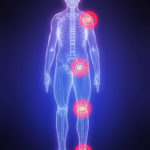By Bonnie Jenkins, Advanced Natural Wellness
A few years ago, American’s discovered a new threat in their local supermarkets – mad cow disease. Now, just as we’ve begun to enjoy our steaks again, beef is once again under the microscope.
What happened to trigger this new concern? Last February, the largest meat recall in U.S. history targeted a massive 143,383,823 pounds of raw and frozen beef. The offender? A single meat packing company that was processing livestock that couldn’t walk – better known in the industry as “downer cows.”
It’s frighteningly close to the story line in a Robin Cook novel – a case of life imitating art. But this time it’s not fiction.
BSE Basics
Reasons for a cow’s inability to walk can include broken bones or severed tendons. But the most frightening prospect is infection with bovine spongiform encephalopathy (BSE), commonly called mad cow disease.
Open your arteries, improve blood flow for a new health miracle...
Did you know your circulatory system has over 60,000 miles of arteries, veins and other blood vessels, if stretched end to end?
But as you age, your blood vessels undergo changes, which may cause them to stiffen, thicken and get clogged.
GOOD NEWS! Doctors have now identified a “Miracle Molecule” inside your arteries that helps OPEN your arteries and IMPROVE blood flow.
It’s what Dr. Valentin Fuster calls it, "One of the most important discoveries in the history of cardiovascular medicine."To you, that means...
- Healthy blood pressure
- Sharper mind and memory
- Skyrocketing energy and muscular strength
- Increased pleasure and passion in the bedroom
- Improved circulation to every cell and organ in your body
Go here to discover a new natural way to significantly boost the levels of this miracle molecule in YOUR body NOW!
Mad cow disease, and its human counterpart Creutzfeldt-Jakob disease, are fatal diseases that cause sudden, progressive dementia, depression, behavioral changes, impaired vision and a loss of coordination. The culprit is an abnormal protein called a prion that transforms healthy protein molecules into infectious ones, eventually causing sponge-like holes in the brain.
Mad cow disease is a recent phenomenon created by cost-cutting innovations in meat production. In order to dispose of slaughtered animal parts that have no commercial value (including the brain and spinal cord, the parts most likely to harbor BSE), the meat industry put them through a “rendering” process that consisted of grinding them up and cooking them in large vats to produce a product that is then fed back to other animals.
Since the first mad cow scare, the government has changed the rules of the game. As of last summer, the U.S. Department of Agriculture’s Food Safety and Inspection Service permanently prohibited the slaughter of cattle that are unable to stand or walk. And cows can’t be given food containing rendered products. Downer cows should also be reported to the USDA. But if this case is any indication, the beef industry must believe that rules are meant to be broken.
Blowing The Whistle
The downer cattle issue became known because of a clandestine video taken by the Humane Society. It showed plant workers using inappropriate means – including electric prods, power hoses and forklifts – to move animals that were unable to walk. Though electric prods are routinely used on healthy animals, their use is not allowed on animals that can’t walk on their own.
The World's Quickest Solution for Ending Prostate and Urinary Misery
This has recently been revealed to be one of the only real breakthroughs in prostate health.
The seeds of a strange fruit (sometimes called "Chinese Apples") hold powerful phytonutrients that are a revolution in prostate health.
In fact, UCLA and Veterans Administration research have now proved this to be true.
Not only that, but it may be the worlds quickest solution for ending prostate misery.
Simply stated, these phytonutrients represent a huge step beyond beta sitosterol, saw palmetto, and other phytosterols alone.
Simply click HERE if you want to have fast prostate relief...restful, uninterrupted sleep...no more constant "urges to go"...enhanced virility...and optimal prostate support for life.
The animal welfare issue prompted the food safety issue, and the Humane Society has now filed suit against the USDA. What’s more, two USDA inspectors at the plant are on forced leave and the plant itself may close down permanently.
Will this trigger real change in the beef industry? Probably not. Although the gross lack of oversight at this plant suggests a very real potential for food safety issues, there was no evidence of BSE in tissue samples, nor was E. coli or Salmonella found in the beef. In fact, according to the USDA, most of the plant’s beef from downer cows had already been sold and presumably consumed over the past two years without any reported illnesses. Still, much of the recalled beef had been slated for school lunch programs – potentially putting children at risk.
But just because no one got sick this time doesn’t mean we should sound the all-clear. It’s likely the government won’t put any real teeth into food laws anytime soon. Even if they do, the beef barons will certainly find ways to skirt the system. One thing is certain: Under the current system, there will be more recalls and it’s only a matter of time before our luck runs out.
One Last Thing . . .
To date, there have been two confirmed cases of mad cow disease in the United States. But since the government doesn’t test all cattle for the disease, consumers can’t be sure what actually gets into the food supply. It could be one or two. It could be hundreds. We simply don’t know – and that is unacceptable.
The only way you can avoid all risk of BSE is to stop eating beef – and maybe all meat – completely until the government steps up the testing of cows and stops giving slaughterhouses a free pass through legislative loopholes. But if you or someone you live with is anything like my husband, an all-out ban on red meat isn’t going to happen.
Short of bypassing the beef, there are some steps you can take to minimize your risk:
- Avoid ground beef, unless you grind it yourself. Proteins that cause BSE in cows are more likely to be in ground beef than steaks, because ground meat comes from several cuts of meat and can include bone marrow or other questionable parts.
- Buy organic beef since it provides some assurance of humane treatment of animals. Small so-called natural beef operations may provide similar assurances.
- Skip processed beef products like hot dogs, sausage and bologna; they are riskier because of the parts of cattle that may be used.
- Stick with whole, boneless cuts to be extra careful. Rolled roasts, for example, instead of bone-in cuts like T-bone steak, may be safer because you avoid the potentially risky marrow.
This Just In . . .
Need another reason to eat your spinach? According to a new study by researchers in Spain, a daily dose of green leafy vegetables may reduce the risk of developing lung cancer – even among smokers and those who have smoked in the past. This encouraging news comes from a new study that analyzed the fruit and vegetable intake of 617 men and women between the ages of 30 and 80 – half of which had lung cancer and the other half who were used as healthy controls.
While the researchers found no protective effect from fruit, they did see a significant benefit to those who ate the most green leafy vegetables like spinach, cabbage, turnip greens and lettuce. Specifically, those who ate green leafy vegetables at least once a day were half as likely to be diagnosed with lung cancer as those who ate them fewer than five times a week. The impressive risk reduction held up even when sex, age, tobacco use and occupation were taken into account.
So take a deep breath and whip up a spinach salad or some good old southern greens for dinner tonight. Your lungs will love you for it!
References:
“BSE and U.S. Measures to Prevent its Introduction into the United States.” USDA. 2001.
Dosil-Díaz O, Ruano-Ravina A, Gestal-Otero JJ, et al. “Consumption of fruit and vegetables and risk of lung cancer: A case-control study in Galicia, Spain.” Nutrition. 2008;24:407-413.
Martin A. “Largest Recall of Ground Beef Is Ordered.” New York Times. 18 Feb 2008.
Richt JA, Kunkle RA, Alt D, et al. “Identification and characterization of two bovine spongiform encephalopathy cases diagnosed in the United States.” Journal of Veterinary Diagnostic Investigation. 2007;19:142-154.






